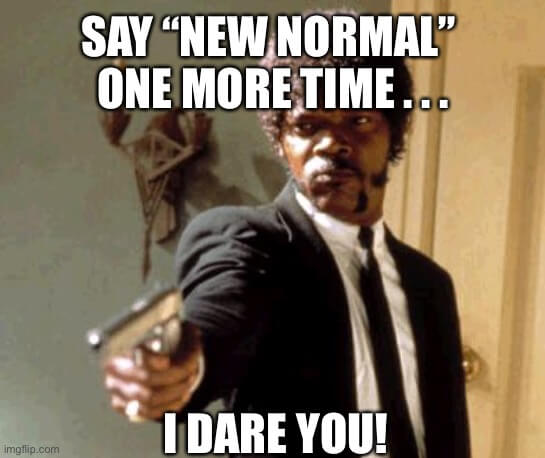The 27 Most Annoying Business Buzzwords of 2021
It’s safe to say that 2020 was a terrible year for most people. While there are more serious lessons to learn from last year, we can all agree on one thing that needs to stay in the past—the annoying business jargon!
In 2019 over half of our community said they hear business buzzwords “often” or “way too much.” This year we returned to discover the most egregious professional faux pas of 2021.

The Most Annoying Business Jargon of 2021
The “unprecedented circumstances” of 2020 brought new jargon to the forefront. When the TrustRadius community voted on their most hated buzzwords of 2021, a clear theme emerged. These terms are so generic, and used so broadly, that it’s impossible to know what they mean.
We combined their answers with data from Google Trends to identify which buzzwords were the worst, and where they’re most abused.

1. New Normal
(New in 2021)
Close your eyes and imagine the most common phrase you heard in 2020. The odds are good that “new normal” would top that list! It’s the number one most annoying business buzzword of 2021.
The “new normal” refers to the state of the world, and how we expect the world to be, after the onset of the COVID-19 pandemic. However, the meaning of the “new normal” has become ambiguous in recent months.
According to Google Trends, people in Peoria-Bloomington metro in Illinois are the most obsessed with this term. “New normal” has almost 3X the amount of search interest there compared to the second-highest metro (New Orleans).

2. Synergy
(Was #1 in 2020)
The reigning champion most annoying buzzword, “Synergy,” only dropped one spot this year. “Synergy” has all the hallmarks of a piece of annoying business jargon. It sounds vaguely futuristic and means next to nothing.
“Synergy” once had a contextual meaning about businesses working together. But the word has been so recklessly bandied about that you need a hasty Google search to understand it.
According to Google Trends, “synergy” has high search interest every year—and almost 8X more interest than “new normal” above. For some reason, people in Nebraska search this term the most. Looking at you, Lincoln metro!
We’d be better off leaving management buzzwords like “synergy” behind along with the rest of 2020.
3. Circle Back
(Was #4 in 2020)
Ah, “circling back.” The least-kept promise in the professional world. This is one of the worst business jargon examples on our list.
To “circle back” to a promise to revisit a particular topic or decision at a later date. This buzzword is particularly popular in Chicago, according to Google Trends.
For many of us, “let’s circle back” is a death knell to whatever idea, proposal, or project was being discussed. Some responsible meeting leaders may honor their promise to circle back. But all too often people use this phrase to sideline an idea without outright rejecting it.
In 2021, let’s commit to being more honest with our colleagues. If you say you’ll circle back, be sure you do. And if you need to reject an idea, give your coworkers the courtesy of being upfront about it.
4. Take This Offline
(Was #3 in 2020)
As a returning leader among hated business buzzwords, “take this offline” took on new irony in 2021. The vast majority of business professionals went remote due to the pandemic. Now we’re left wondering: What does “offline” look like anymore?
More often than not, “take this offline” simply means that the topic should be discussed outside the current group meeting—which is a fair and reasonable proposal. However, now even private conversations are all conducted over video conference or another collaboration tool.
Apparently, people in Alaska are most guilty of overusing this buzzword. Fairbanks, Juneau, and Anchorage all come in as top cities with the most searches for this annoying term.
“Taking this offline” is but a cruel reminder of the days when we could follow up a conversation over coffee or by swinging by someone’s office. Scheduling another Zoom meeting just doesn’t feel the same….

5. Pivot (New)
(New in 2021)
We’ve got another newcomer on the list for 2021. Over the past year, we’ve seen COVID-19 shatter most of our business plans. Since virtually everyone needed to deviate from the plan for the year, “pivoting” became an all-too-familiar phrase.
As the pandemic dragged on, the need for pivots upon pivots felt like a constant upheaval. Now the term sparks confusion, stress, or eye-rolling for business professionals.
A “pivot” always signals oncoming change—but the speaker often doesn’t provide clarity on what those changes will be. That’s what makes this a common management buzzword. “Pivot” is an easy way to leave professionals in an ongoing state of ambiguity and uncertainty.
My advice: rather than using “pivot,” leaders should just walk through what the pivot actually entails!
6. Unprecedented
(New in 2021)
In April I took an informal poll of my LinkedIn community on which business buzzwords they hate the most. At that time, “unprecedented” took the top spot by a long shot.
Way too many people use the term “unprecedented circumstances” to talk about the pandemic without using the “P word.” But for the rest of us, it was an overused reminder of just how badly our lives had been disrupted.
According to Google Trends, search interest for “unprecedented” increased 10X in March 2020 (go figure). As people started overusing the word, the rest of us had to google it to figure out if they were telling the truth. Unfortunately they were. This entire situation was, indeed, unprecedented.
Google Trends shows a particular interest for this term in Hawaii of all places. No idea why. I offer no theories on this one.
This year we should all strike “unprecedented” from our vocabulary. After all, 2020 did a pretty good job of giving us a “precedent” for everything—even the plague!
7. Think Outside The Box
(Was #2 in 2020)
“Think outside the box” is a great way to say something while saying nothing at all. This is a classic phrase in the annoying business jargon lexicon. It’s apparently very popular in Minnesota (according to Google Trends).
“Think outside the box” can mean almost anything outside of “do what we’ve already done.” This abstraction gives precious little insight into what kind of action people should take. The phrase doesn’t even bother to define what “box” we should be thinking outside of.
Over the past year, “thinking outside the box” has fallen in annoyance-level compared to other similar phrases. Maybe 2020 demanded so many different ways of thinking that we are all collectively thinking in new ways. Let’s continue that momentum into 2021.
8. Low-Hanging Fruit
(Was #5 in 2020)
“Low-hanging fruit” is a mainstay in the Hall of Hated Buzzwords. The term refers to actions that are easy to do, especially compared to more difficult options. This term never refers to actual produce. It’s just a way to call something “easy but still worth doing.”
Why does “low-hanging fruit” earn a spot on this list? Because, like other business buzzwords, it adds virtually nothing to a conversation. When someone says “low-hanging fruit,” they could just stop speaking right there. That would provide the same amount of information as if they’d spent the extra breath. We should all leave this buzzword to the farmers in 2021.

9. Work From Home
(New in 2021)
“Work from home” toes the line between misused and overused buzzwords. Since mid-March 2020, nearly everyone who was able to work from home has been doing so. By now, many corporate professionals have an uncomfortable level of familiarity with the concept.
This term is especially prevalent in Georgia. According to Google Trends, the state and 3 metros (Albany, Columbus, and Augusta) made our top list of places with high interest in this term.
Our frustration with “working from home” as a buzzword likely has more to do with our frustration with the impact this change has had on our lives. And, as a consequence, the sheer volume of marketing we all now receive around the WFH concept. If you’ve spent the last year sharing a workspace with children, pets, or less-than-considerate neighbors, the last thing you need is a marketer spamming your inbox with another email on the “challenges of working from home.”
10. Bandwidth
(Was #16 in 2020)
We usually use the word “bandwidth” as a new way of saying “how much we can get done.” People normally use this annoying business jargon to indicate when there isn’t enough time. During the COVID-19 pandemic, it’s safe to say that we all ran out of “bandwidth” at some point or another.
What’s annoying is when people use this word instead of being direct. Some think that “I don’t have the bandwidth” is a less offensive way to say “I don’t have the time to do what you asked.” We’re all obsessed with staying one verbal degree away from saying “no” to someone.
This might be more comfortable for some, but it also adds another unproductive turn of phrase to the jargon dictionary. Nobody has the “bandwidth” for that!
11. Reach Out
(Was #31 in 2020)
With the biggest jump on this list, “reaching out” hit new highs of hatred in 2021. As the pandemic unfolded, we all received multiple emails per day from companies, vendors, and marketers who were “reaching out” to check in. They might have wanted to see how we were doing. But most importantly, they wanted to make sure the money was still flowing.
“Reach out” was briefly deemed the most delicate, “empathetic” way of contacting customers to make sure they were still paying. Unfortunately, this phrase became so ubiquitous that we all got wise to its real meaning.
Anyone trying to “reach out” is most likely trying to get in your budget.
12. Diversity-related Buzzwords
(New in 2021)
As companies navigated the ramifications of the murder of George Floyd and the movement for racial justice, we were less than pleased with how the tech industry tried (and failed) to respond to social change.
This is one of the worst corporate jargon examples we’ve seen this year.
PR teams often used words that have specific meaning among diversity, equity, and inclusion (DEI) advocates. But using the words isn’t enough.
We witnessed a lack of authentic change even after companies released marketing campaigns with words like “inclusion,” “gender equality,” and “woke.”
One member of the TrustRadius community described this experience:
“We stand in solidarity with…” No, you don’t. You’re only making a post about it because every other company is saying it and you want to save face.
According to Google Trends, the DC metro area has twice the search interest in “diversity and inclusion” than any other subregion. I’ll take that as a good thing.
To dive deeper into the state of racial diversity in tech, check out the free People of Color In Tech report.
13. Zoom [as a verb]
(New in 2021)
After the year we just had, it’s astounding that this annoying business buzzword isn’t higher on our list. Before 2020, Zoom was among a group of competitive leaders in the web and video conferencing space. Now, as remote work has been the norm for most of 2020, “Zoom” is used interchangeably as a noun and a verb.
To Zoom’s credit, it takes a certain amount of market clout for your product’s name to be synonymous with its function. Skype held this coveted position years ago before being sunset into Microsoft Teams.
Unfortunately, this buzzword constantly forces us to acknowledge our current circumstances. Most of the tech world had to become all day, every day users of web conferencing software. While reviewers speak highly of Zoom on TrustRadius, it’s a word best left as a noun for 2021.
14. Deep Dive
(Was #15 in 2020)
Doing a “deep dive” into something sounds great at first glance. It’s a good idea to explore the details and understand a topic on a deeper level. Right? Still, there’s a clear reason why this piece of annoying business jargon made our list.
In reality, when someone asks you to do a “deep dive,” it’s often a not-so-subtle critique of the work you’ve already done on the topic. All too often, deep dives are requested of other people. To be fair, the phrase may have some specific, limited place in the corporate world. However, it never bodes well for the person who will be spending the weekend conducting the “deep dive.”
15. Agile
(Was #12 in 2020)
Once upon a time, “agile” had a very specific contextual meaning in the business world.
“Agile” is a work methodology that emphasizes adaptability and continual reevaluation. This contrasts with the traditional waterfall approach, which prioritizes maintaining a consistent vision. Those familiar with project management or software development know these terms well.
That’s not how “agile” is used in everyday jargon.
You’ve probably heard someone use the word “agile” to imply some vague amount of flexibility or adaptability. There’s precious little substance behind what people think it means to be “agile” in this context.
According to Google Trends, this term is ever-present in California. We’re seeing huge interest in the San Francisco bay area (which isn’t surprising at all).
Fortunately, “agile” dropped down a few places in the top 15 this year. This could mean that being able to adjust to unexpected circumstances is now the default.
16. Alignment
(Was #24 in 2020)
“Alignment” runs into many of the same problems as “synergy.” On one hand, it can have real value as a concept. As organizations grow, questions of “alignment” are increasingly important to ask. But “alignment” has taken on so many contextual meanings that the term means very little.
People who use this buzzword often don’t specify the nuances of what kind of alignment they want. Saying “alignment” alone leaves everyone feeling confused about what they’re supposed to be “aligning” around.
This appears to be a growing problem in 2021, as this term rose 10 spots in our Most Annoying ranks. It seems to be particularly popular across the major cities of Texas. Ironically, we can all “align” around how annoying this word is.

17. Digital Transformation
(Was #14 in 2020)
Digital transformation should mean something very specific. But that meaning differs from how the term is often used.
Broadly speaking, digital transformation means using digital-first technologies to make your business better. However, digital transformation is often used as code for “buying another product to replace a manual process.” This interpretation can sometimes be appropriate. But we risk overusing the term both internally and in marketing copy.
The events of 2020 may have made “digital transformation” more acceptable than in prior years. Most businesses were forced to digitize processes that had previously been physical or in-person. While this is a deviation from what “digital transformation” meant in the past, 2020 may have made this term more applicable than in prior years.
“Digital transformation” saw the most search interest in New York this year.
18. Double-Click
(New in 2021)
“Double-clicking” is the prime example of a business buzzword that just doesn’t need to exist. Obviously, it’s a reference to how computer users click twice on files to go into the location in more detail. As an aside, most UX designers now prefer single-click experiences.
But this buzzword may outlive the original meaning. “Double-clicking” is a commonly used term when someone wants to discuss a topic more in-depth. That’s it. More straightforward alternatives could include: “let’s discuss this point more,” or “I’d like to talk more about this.” “Double-clicking” is more a relic of a time gone by than anything we need to bring into 2021.
19. Trying Times
(New in 2021)
Over the past year, we saw companies struggle to find new ways to refer to the COVID-19 pandemic. Instead of using the word “pandemic” outright, they deferred to thinly-veiled references. “Trying times” is one of the more ubiquitous and least descriptive terms they used to describe what we all were going through.
At least “unprecedented circumstances” (#6) was indicative of our insane global situation. In contrast, plenty of people experienced “trying times” before the pandemic. If anything, this buzzword underplayed the severity and uniqueness of the COVID-19 pandemic. That’s why it earned a spot on this list.
We’re seeing West Virginia and Iowa as first time “buzzword offenders” for this term. Perhaps people in those states are oddly fond of lame euphemisms.
20. Thought Leader
(New in 2021)
Anyone who’s spent any amount of time on LinkedIn understands why this jargon is on the most annoying list. “Thought leader” is a subjective label for influencers in the business world. This label can apply to either organizations or individuals.
The term “thought leader” is often used boastfully—as a vaguely aspirational measure of one’s own clout in the business community. But because the term is usually used by the person themselves (and not a third party), it’s hardly indicative of real expertise. One might struggle to differentiate between being a “thought leader” and sitting at the cool kids’ table in middle school.
Some individuals may truly strive to push the bounds of thought in a certain area. But we should be cautious that our attempts to become a “thought leader” aren’t more focused on promoting ourselves than our ideas.

21. Open the Kimono
(New in 2021)
Last and certainly not least—the most sexist and racist buzzword of 2021.
Literally speaking, “opening the kimono” is an old term that leans on sexist and racist notions of Asian women exposing their physical bodies. This buzzword has historically been used in a business context when a company exposes their inner processes to another party.
As businesspeople come to terms with issues of sexism, racism, and discrimination, the term has rapidly fallen out of favor. It falls into the same category of jargon as “getting into bed” with another business and is problematic for similar reasons. But way too many people still use these terms every day.
California has over 5x the amount of interest in this term compared to other states. According to Google Trends, the vast majority of that interest comes from the Bay Area.
We can all agree that this term is “kind of creepy” and highly inappropriate—especially because of its sexist and racist origins. This is a phrase that should go where all other sexist, racist, and discriminatory business buzzwords go to die.
Why Business Buzzwords Matter
We use jargon because it feels convenient, comfortable, and safe. But buzzwords actually make it harder for us to communicate effectively.
These terms add nothing to a conversation. They obscure the clarity of your sentences. And they alienate others around you who aren’t sure what you mean.
The events of 2020 inspired a whole new side of annoying business jargon. When companies parroted buzzwords relating to COVID-19 and DEI, they distracted us from the crucial conversations we needed to have.
As we all work to address the pressing challenges of 2020, we must have more integrity with our language. We have to fight the trend toward performative marketing. We need to be comfortable discussing these issues head-on in the business community, without the vagueness of jargon. And we need to come prepared with a clear plan of action.
Let’s be conscious of how we communicate with our coworkers, teams, and the rest of our community going into 2022.
Want more Buzzwords? Check out our list of MOST HATED tech buzzwords.
Was this helpful?
